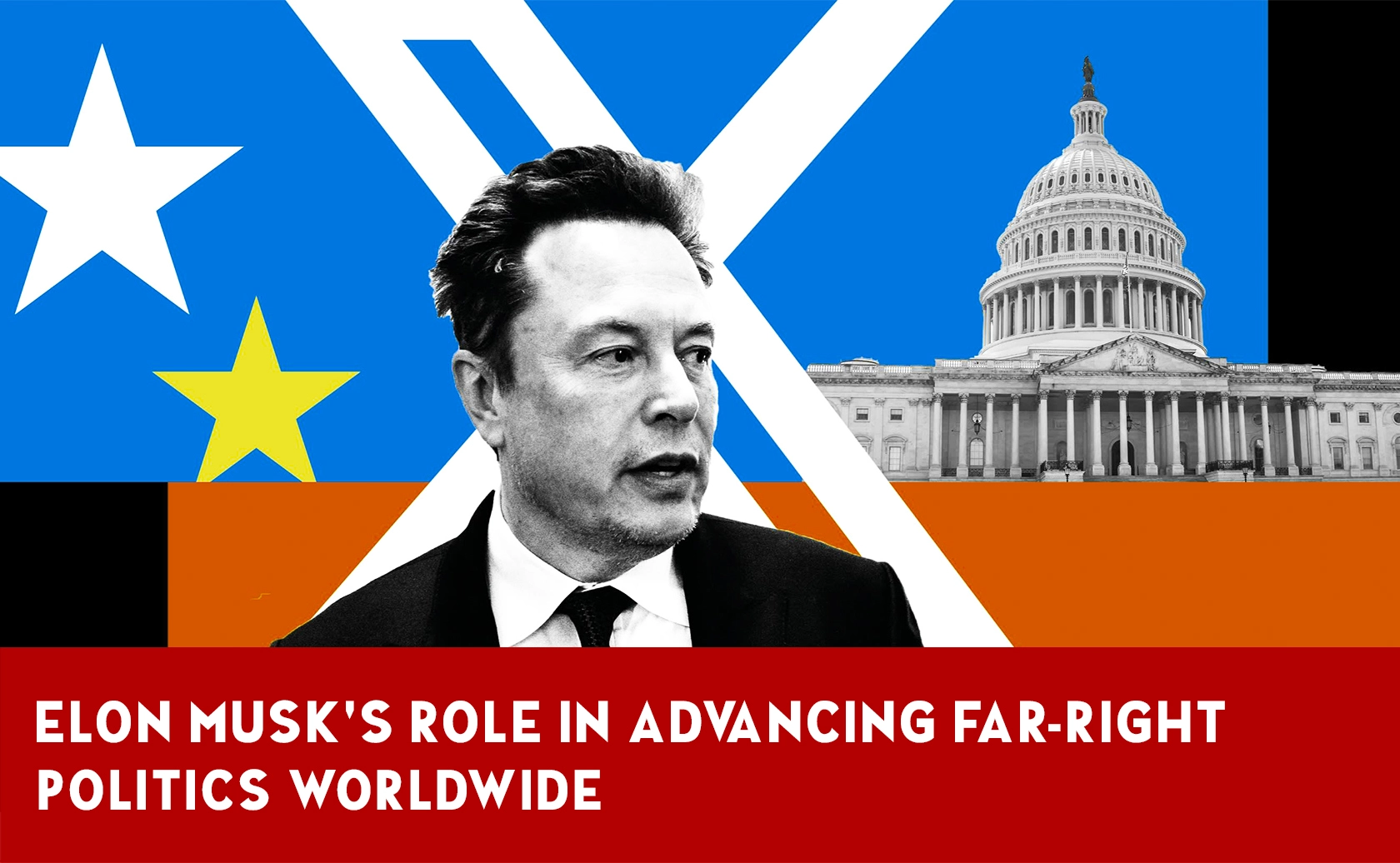Elon Musk’s transformation from a Silicon Valley innovator to a far-right kingmaker began in earnest following his acquisition of Twitter in 2022. Renaming the platform X, Musk dismantled content moderation policies, reinstated banned accounts tied to extremism, and prioritized algorithmic amplification of divisive content6. By late 2024, his political activities escalated: he donated $290 million to Donald Trump’s presidential campaign, endorsed 18 far-right parties globally, and framed his activism as a defense of “free speech”14.
Critics argue that Musk’s vision of free speech selectively empowers authoritarian narratives. His support for Germany’s AfD—a party linked to neo-Nazi ideology—exemplifies this paradox. At a December 2023 rally in Halle, Musk declared, “It’s OK to be proud to be German,” a message that resonated with AfD members advocating ethnic homogeneity35. Similarly, his calls for Italians to “produce more children to preserve culture” at Rome’s Atreju conference aligned with far-right pronatalist agendas1.
Musk’s strategy combines financial clout, technological infrastructure, and a self-styled “anti-establishment” persona. Yet his rhetoric often clashes with his business interests. For instance, Tesla’s reliance on green energy subsidies contrasts sharply with his support for anti-climate politicians like Trump4. This dissonance underscores a broader tension: Musk’s political ambitions risk alienating the progressive base that once celebrated Tesla’s environmental mission46.
As far-right parties gain electoral ground—from the AfD’s historic 20% vote share in Germany to Italy’s Brothers of Italy—Musk’s role as a transnational agitator raises urgent questions. Can democratic institutions withstand the influence of a billionaire unaccountable to voters? And what happens when techno-libertarian ideals merge with authoritarian nationalism?
Table of Contents
ToggleMusk’s European Crusade: AfD, Nationalism, and the Far-Right Surge
Elon Musk’s endorsement of Germany’s Alternative for Germany (AfD) marks a significant escalation in his support for European far-right movements. The AfD, known for its anti-immigration stance and ties to extremist groups, has become a focal point in German politics, particularly as the country prepares for elections. Musk’s statement, “Only the AfD can save Germany,” resonated with the party’s base but sparked outrage among mainstream German politicians and civil society135. Musk’s influence extends beyond Germany. He has also supported Italian Prime Minister Giorgia Meloni and British politician Nigel Farage, both prominent figures in European right-wing populism13. This pan-European strategy aligns with his broader nationalist agenda, which emphasizes the preservation of cultural identity and sovereignty. However, critics argue that such nationalism often veils xenophobic and authoritarian tendencies, threatening the EU’s liberal democratic foundations2.
The AfD and Musk’s Endorsement
The AfD’s rise in Germany is emblematic of a broader trend in European politics, where far-right parties are gaining traction by capitalizing on economic anxieties and anti-immigrant sentiment. Musk’s endorsement not only amplifies this trend but also underscores the role of social media in shaping political discourse. His platform, X, has become a critical tool for disseminating far-right ideologies, often bypassing traditional media scrutiny6.
American Allies: Trump, Vance, and the 2024 Election Blueprint
In the United States, Elon Musk’s political influence is most evident in his support for Donald Trump. Musk donated over $290 million to Trump’s 2024 presidential campaign, making him the largest donor26. This financial backing was accompanied by vocal endorsements on X, where Musk promoted Trump’s candidacy and echoed his rhetoric on issues like immigration and election integrity.
Musk has also shown support for other conservative figures, such as J.D. Vance, who won the Ohio Senate seat in 2022. Vance’s campaign was notable for its embrace of Trumpism and its focus on cultural issues, aligning with Musk’s broader nationalist agenda6.
Musk and Trump: A Political Alliance
The alliance between Musk and Trump represents a convergence of tech mogul influence and traditional political power. Musk’s wealth and social media reach have been instrumental in amplifying Trump’s message, while Trump’s political machinery has provided Musk with a platform to shape policy discussions. This partnership has significant implications for American politics, as it blurs the lines between corporate influence and political authority6.
Beyond the West: Exporting Right-Wing Narratives to Africa and Asia
While Musk’s political activities are most visible in Europe and the U.S., his influence extends to other regions. In Africa, for instance, Musk has been associated with figures advocating for nationalist and anti-immigration policies. Similarly, in Asia, his support for authoritarian leaders has been interpreted as a form of ideological alignment with regional far-right movements2.
Globalizing Far-Right Politics
Musk’s global reach allows him to export far-right ideologies across continents, leveraging his technological infrastructure and personal connections to create a transnational network of like-minded politicians and activists. This globalization of far-right politics poses challenges for democratic institutions worldwide, as it often involves the dissemination of divisive rhetoric and the erosion of civil liberties2.
X as a Far-Right Megaphone: Algorithms, Censorship, and Disinformation
X, under Musk’s ownership, has become a critical platform for far-right voices. The dismantling of content moderation policies has allowed extremist content to flourish, often reaching wider audiences through algorithmic amplification. This shift has raised concerns about the spread of disinformation and hate speech, which can have real-world consequences, such as inciting violence or undermining democratic processes6.
The Role of Algorithms in Amplifying Extremism
Musk’s approach to free speech on X has been criticized for prioritizing the visibility of far-right content. By tweaking algorithms to favor provocative or divisive posts, Musk inadvertently creates an environment where extremist ideologies gain traction. This strategy not only boosts engagement but also contributes to the normalization of far-right discourse, potentially radicalizing users and influencing political outcomes6.
Investor Revolt and Corporate Fallout
As Elon Musk’s political activities become more overt, they are beginning to impact his business interests. Investors in Tesla and other Musk-led ventures are increasingly concerned about the reputational risks associated with his far-right endorsements. This backlash could lead to financial consequences, such as divestment or decreased consumer loyalty, particularly among progressive consumers who once supported Tesla for its environmental mission6.
The Economic Consequences of Political Polarization
Musk’s political stance has created a rift between his business ventures and the progressive values they once represented. The potential economic fallout from this polarization could be significant, as consumers and investors reassess their relationship with Musk’s companies. This scenario highlights the challenges of navigating political activism while maintaining a global brand image6.
The “Post-Ideological” Oligarch: Libertarianism or Authoritarianism?
Elon Musk often describes himself as a libertarian, advocating for minimal government intervention in business and personal life. However, his support for authoritarian leaders and far-right movements complicates this self-image. Critics argue that Musk’s actions align more closely with authoritarian nationalism than libertarian principles, as he seeks to influence political outcomes without being accountable to democratic processes26.
The Paradox of Libertarian Authoritarianism
Musk’s political activities reveal a paradox: while he espouses libertarian ideals, his actions often empower authoritarian figures. This contradiction raises questions about the compatibility of libertarianism with nationalist ideologies and whether Musk’s influence is undermining democratic norms in favor of a more centralized, authoritarian control2.
Global Repercussions: Democracy, Free Speech, and Musk’s Legacy
Elon Musk’s role in boosting far-right politics has profound implications for global democracy. His ability to shape political discourse through X and his wealth challenges traditional notions of political authority and accountability. As Musk continues to influence elections and ideologies worldwide, his legacy will be defined by whether he strengthens democratic institutions or erodes them in favor of authoritarianism26.
The Future of Democracy in the Age of Tech Moguls
The intersection of technology, wealth, and politics, as exemplified by Elon Musk, poses significant challenges to democratic governance. The question remains whether democratic systems can adapt to the influence of unelected tech moguls or if these figures will continue to reshape political landscapes in their image26.
The Impact on Civil Society: Polarization and Social Cohesion
Elon Musk’s support for far-right ideologies has contributed to increased polarization within civil society. His platform, X, has become a hub for divisive rhetoric, often amplifying extremist views that can erode social cohesion. This polarization is not limited to online spaces; it has real-world implications, such as increased tensions between communities and the normalization of hate speech.
Polarization and Its Consequences
The amplification of far-right narratives by Musk and his platform has significant social consequences. It can lead to increased conflict between different groups, undermine trust in institutions, and create an environment where extremist ideologies flourish. This scenario poses a challenge to maintaining social harmony and promoting inclusive democratic values.
The Role of Media and Public Discourse
The media plays a crucial role in shaping public discourse around Elon Musk’s political activities. While some outlets have criticized his support for far-right movements, others have provided platforms for him to articulate his views. This mixed response reflects broader challenges in media coverage of tech moguls and their political influence.
Media Coverage and Public Perception
Media coverage of Musk’s political activities influences public perception of his role in boosting far-right politics. Balanced reporting is essential to ensure that the public is well-informed about the implications of his actions. However, the complexity of Musk’s persona—both as a tech innovator and a political figure—can complicate media narratives, leading to varied interpretations of his influence.
Regulatory Responses: Can Governments Intervene?
Governments worldwide are grappling with how to regulate the influence of tech moguls like Elon Musk on political discourse. The challenge lies in balancing free speech with the need to prevent the spread of harmful content and protect democratic processes. Regulatory efforts, such as the EU’s Digital Services Act, aim to address these issues but face resistance from tech companies and free speech advocates.
The Regulatory Dilemma
Regulating Musk’s influence poses a dilemma: how to ensure that platforms like X do not become conduits for extremist ideologies without infringing on free speech rights. This requires nuanced legislation that can distinguish between legitimate political discourse and harmful content, a task complicated by the global nature of online platforms.
Conclusion: The Future of Politics in the Age of Musk
Elon Musk’s role in boosting far-right politics across the globe highlights the evolving nature of political influence in the digital age. As tech moguls increasingly shape political narratives, it is crucial for democratic societies to adapt and ensure that such influence does not undermine democratic norms. The future of politics will depend on how effectively governments, civil society, and the media navigate these challenges.
A New Era of Political Influence
Musk’s impact on global politics marks a new era where tech moguls can wield significant influence without traditional political accountability. This shift raises fundamental questions about the future of democracy and how societies will balance technological innovation with political stability.
Final Thoughts
As Elon Musk continues to shape political discourse, his actions will be closely watched by governments, civil society, and the media. The implications of his influence on far-right politics will be far-reaching, impacting not only the political landscape but also social cohesion and democratic institutions worldwide.




